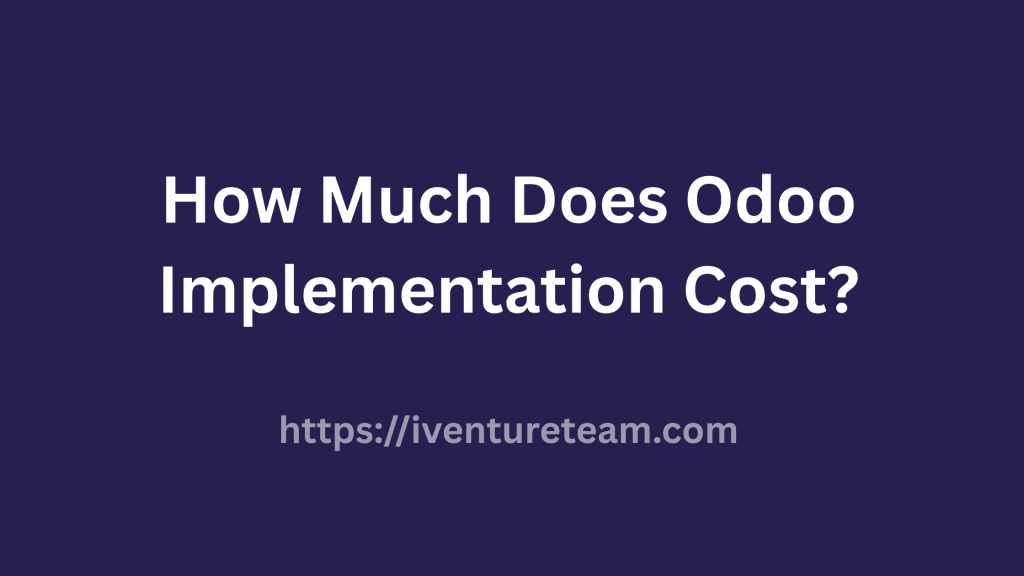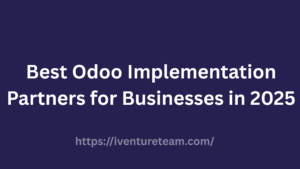Odoo is an end-to-end business management solution that integrates all of sales and CRM with accounting and stock control. It provides a smart and scalable answer aimed at streamlining processes and driving business success.
While the software itself may not be extortionately priced, the Odoo implementation cost can be drastically influenced by many various factors. How much you pay will be based on your individual business needs, your methods for implementing the system, and how you intend to utilize it.
The more sophisticated your needs are, the more expensive the implementation will be. Proper planning will enable you to reap the most benefit from your investment with expert Odoo implementation services. This blog explains the key cost factors and breaks them down by business type. And share tips to reduce your Odoo implementation cost.
Table of Content
Key Factors That Influence Odoo Implementation Cost
Odoo Implementation does not have any fixed fee to pay. Different businesses will be charged differently depending on some significant factors. Here are the most significant ones given below:
1. Number of Users and Access Rights
If you have a larger number of employees in your business, the cost of Odoo will be higher. Odoo charges per user every month. Small teams may only need ten to twenty users, but large businesses often require fifty or more.
In addition, user permission rights configured contribute to the total setup fee, as it takes into account the implementation of roles, permissions, and security policies for various users. A couple of users need full access to all modules, while others need merely to view the reports or input the basic data. Implementing these access levels is time-intensive and adds to the overall cost.
2. Module Selection
Odoo contains many modules that address various segments of your business. Common modules are Sales, Inventory, Accounting, Invoicing, CRM, and Human Resources. Limiting the number of modules helps reduce the total implementation cost. If you have additional modules on your system, it is time-consuming to install, test, and train staff, which adds to the project cost.
For example, a small retail company might require only sales and invoicing. A large manufacturing company might require Accounting, Purchasing, Manufacturing, Warehouse, etc.
3. Level of Customization Needed
Odoo has numerous built-in features, but not all businesses are created equal. When your business requires workflows or screens that are not available in Odoo, custom development is needed.
Customization is the largest cost driver within an Odoo project. Even simple changes, such as adding fields or buttons, can involve code. More sophisticated changes, such as creating custom reports or automation, can take weeks.
Implementation costs increase with every customization or change you make to the system. Some organizations modify their processes to fit into conventional Odoo tools, which are expected to save money.
4. Data Migration & Cleanup
You might need to migrate existing data, i.e., customers, products, and past sales, to Odoo. This process is called data migration. If our current data is well-organized and clean, then the migration will be faster and cheaper. However, if our data is spread across systems, duplicated, or badly formatted extremely, then it will take longer to prepare.
5. Integration with Third-Party Tools
Odoo can also be integrated with other software packages that you are likely to use, such as e-commerce websites, accounting packages, payment gateways, or shipping providers.
The integrations can either be straightforward or complicated. If Odoo supports the tool natively, the Integration can be quick and easy. If the tool is rare or needs to be developed, the expenses will be greater.
6. Training & Documentation
After installing Odoo, your employees need to be trained on how to use it. Training ensures your employees input accurate data, follow the right steps, and utilize the system to its maximum capacity.
Training is available online, on-site, or from manuals. Some partners conduct live sessions, while others conduct video sessions that have been recorded. Your staff might require multiple sessions spread over weeks in some cases.
Hosting: Odoo Online vs. Odoo.sh vs. On-Premise
Odoo gives you three hosting options to work with, each having different features and costs. Your selection will depend on the size of your company, technical needs, and the amount of customization. These include:
Odoo Online: Odoo Online is the most straightforward form of Odoo, with everything hosted on your behalf. It’s best suited for small teams with basic requirements that do not require extensive customization. You can’t add custom apps or make significant changes to the system.
Odoo.sh: It’s Odoo cloud hosting with more control and flexibility than Odoo Online, i.e., adding custom modules and selecting your implementation partners. You can add more apps, test, and control your updates yourself. It is perfect for firms that need greater flexibility without having to host servers.
On-Premise: Odoo is stored on your business server. You have possession of the system but also have the responsibility for updates, backups, and security. This setup typically requires in-house IT staff or an external service firm to maintain and operate the system effectively.
Odoo Implementation Cost Breakdown by Business Type
Different companies will pay varying levels of Odoo based on their size and needs. Following is a simple-to-read overview that is applicable to small, medium, and large businesses:
Odoo ERP Implementation Cost for Small Businesses
Small businesses with fewer than 10 users start with some base modules, like Sales, Invoicing, and Inventory. They like Odoo Online, which makes hosting easy and economical. These businesses hardly ever need to have sophisticated customization. Most are happy with having a low-cost implementation and improving default features.
A small business will pay anywhere from $5,000 to $20,000 for a complete installation. This will include licenses, deployment, training, and basic support. Any project will take one or two months to develop.
Odoo ERP Implementation Cost for Mid-sized Businesses
Medium-sized businesses with 10-50 users may need more modules, such as CRM, Accounting, Human Resources, or Manufacturing. The businesses will need medium customization to suit their in-house procedures. They will also require training in every department and Integration with other software.
Odoo.sh is frequently chosen by mid-sized businesses as the host. It offers the control they need without complexity when it comes to system updates.
The price for a mid-sized company is normally between $20,000 and $50,000 project duration is typically two to six months, depending on complexity.
Odoo ERP Implementation Cost for Large Enterprises and Corporations
Large corporate businesses with over 50 users need a full Odoo deployment, including base modules like Manufacturing, Payroll, Purchase, Projects, and Helpdesk. They require customizations, extensive reports, importing data, and system integrations. Based on IT policy, they utilize Odoo.sh or on-premises hosting. They cost between $50,000 and $100,000 or more and take six months to twelve months to implement, including training and support.
How to Reduce Your Odoo Implementation Cost?
While Odoo can be expensive, there are still ways to reduce costs smartly without compromising quality. Begin by implementing only the essential core modules that your business truly needs. This makes your initial investment low and reduces the learning curve for your personnel. After your personnel are accustomed to using the system and it runs on autopilot, you can add more modules incrementally as needed. Steps to reduce your Odoo Implementation cost are as follows.
Try to use the standard feature as far as possible, where heavy customization should only be used when necessary. Managing your work process with Odoo may be less expensive than customizing Odoo to work with your process.
Clean your data before migrating, like eliminating duplicates, correcting errors, and formatting your spreadsheets in order. Accurate data can save you hundreds of hours during and after the migration process.
Focus and select the appropriate hosting solution. If your environment is straightforward, Odoo online is an effective and problem-free choice. For more control and flexibility, without managing your servers, Odoo.sh offers the perfect middle ground with advanced features and easier custom deployment.
Begin by training your key employees first. Once they are trained, have them train the remaining employees. This approach saves total learning time and also creates excellent in-house knowledge.
Finding the right implementation partner is equally critical. Choose a partner who gives you transparent quotes, a readable project schedule, and a clear definition of what you are paying for. Some vendors provide fixed-cost packages, but others charge by the hour, so ensure that you look at the model before embarking.
Plan your finances and watch out for buried charges. Add-on services, additional reports, yearly software updates, or new app licenses may generate additional costs. To manage your expenses wisely, start with only the essential stage and later upgrade to additional features in phases. This staged approach spreads cost over time and minimizes financial risk.
Conclusion for Odoo Implementation Cost
Odoo is a perfect choice for businesses looking for an affordable and flexible ERP solution. Implementation costs are fairly generic in the standard version and may vary depending on the particular needs of your business.
For the small business, the price would be as low as five thousand dollars. The large organizations with more users and those with strict requirements can go over one hundred thousand dollars. The overall price depends on some variable parameters like the number of users, chosen modules, custom development requirements, and the data migration needs.
In order to maintain your cost at the lowest, preplanning is inevitable. Start with the core modules, build a strong internal team, and grow slowly while your company grows. If you’re unsure how to begin, contact an accredited Odoo implementation company. A specialist will provide you with a tailored estimate and a realistic timeline and set you off on your way to success.
Related Post:








